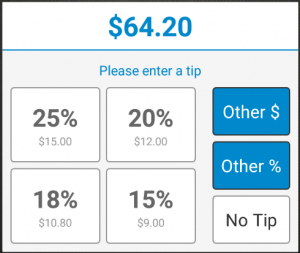In American restaurants, tipping culture reigns supreme. Some POS systems allow your restaurant to suggest gratuities, streamlining the process.
As you know, tipping is the act of leaving a monetary bonus to reward waitstaff for a job well done. The amount a customer chooses to leave as a tip is typically a percentage of the overall bill. While not strictly required, tipping is strongly encouraged in most — if not all — restaurants in The United States.
How much should a guest tip their bartender or server? There’s no real right answer to that question; tipping is an arbitrary concept, entirely up to the customer’s discretion. In the United States, it’s customary for restaurant goers to tip waitstaff 15 – 20 percent of their bill without any applicable meal discounts factored in.
Since there’s a lot of grey area, some restaurants utilize suggested gratuity to give guests a better idea of how much to tip.
- What Is Suggested Gratuity?
- Automatic Gratuity
- How Does Suggested Gratuity Help Restaurants?
- Suggested? More Like Strongly Encouraged
What Is Suggested Gratuity?
Suggested gratuity is, as the name implies, a suggestion on how much to tip. Amounts are typically tiered depending on the level and quality of service. The suggestions appear at the bottom of a guest’s bill, underneath the total.
Here’s an example of a digital receipt with suggested gratuity included:

Suggested gratuity can appear in the following two forms:
- Percentages
- Fixed Dollar Amounts
When the suggestion is a percentage, it often includes the dollar amount that the percentage works out to.
Suggested Gratuity Percentages
Percentages are more popular in sit down dining and fine dining atmospheres, where it is customary to tip your server 15-20% of your total bill in thanks for their continued hospitality during your visit. The image above shows a percentage based suggest gratuity option. It also includes rounded off dollar amounts for that percentage based on the total bill.
The best POS systems will allow restaurant managers to customize the suggested gratuity percentages shown to customers, and can choose to calculate these suggested gratuity percentages based on the total with or without tax included.

In some popular systems, like Toast’s POS system, you can also choose whether large tips will require management approval. If you require approval, you’ll set the percentage or dollar value that serves as the threshold for approval. Any tips over those amounts will require manager sign off. This helps prevent any funny business by staff giving themselves larger tips than a customer intended.
Fixed Dollar Suggested Gratuity
This option is more popular in quick service restaurants, bars, and coffee shops. Most often, quick serve restaurants don’t have formal table service, but tips are still common. In those cases, checks are usually smaller and fixed dollar amounts are faster and more generous.
Automatic Gratuity
Different than suggested gratuities, automatic gratuity is another tactic used by restaurant owners and operators to curtail the guesswork involved with tipping. Automatic gratuity includes the server or bartender’s tip — traditionally 18% — in the final bill. White tablecloth or other fine dining establishments may utilize automatic gratuity, where the level of hospitality guests receive is top notch. You may also see it used for large parties. (Common for 6 or more in some restaurants, 8 or more in others.)
Auto-gratuity is not as popular as it once was, due to changes several years ago. In 2014, the IRS re-categorized tips received as a result of automatic gratuity from being considered tips to being considered a service charge, which introduced a few new headaches and consequences for restaurant employers and employees. As a result, many restaurants have moved away from using automatic gratuity in order to avoid the hassle.
How Does Suggested Gratuity Help Restaurants?
Though technically front of house restaurant staff are paid ‘minimum wage,’ the legally mandated restaurant minimum wage (sometimes called tipped minimum wage) is a significantly less than the legally mandated minimum wage in other industries.
Since tipping has become an intrinsic part of the American restaurant industry, the United States government considers front of house restaurant employees “tipped wage employees”, which allows your restaurant the leeway to pay front of house employees a lesser wage, knowing customers’ tips will make up the difference.
It is worth noting that if after completing a shift, a tipped wage employee has not earned enough money to equal what they would have been paid per hour at the non-tipped minimum wage rate, it is the employer’s responsibility to supplement their paycheck by making up the difference.
Just to be clear: whether to tip and how much is entirely the customer’s choice, and not leaving a tip is one of those choices. One customer may be trying to stick to a budget and can only afford to tip 10%. Another customer also may have a personal rule that they always tip 18%, regardless of their experience.
However, suggested gratuities are still beneficial for a few reasons.
Speeds Up the Payment Process
Suggested gratuity cuts out the guesswork involved with deciding on how much to tip; the restaurant has already done the math for the diner. You’re helping your customers by making the tipping process quick and painless: they can select a suggested gratuity amount without having to do the math themselves.
Offers a Reminder at Quick Serve Restaurants
In certain dining scenarios — quick service restaurants come to mind — though the bill includes a “tip” line, patrons aren’t sure whether they’re actually supposed to tip. As the traditional association with tipping is that the guest is rewarding a server or bartender for their continued support and hospitality during the dining experience, which doesn’t occur in quick service concepts, many quick serve patrons skip the tip line. Including a suggested gratuity call out says to customers, “Yes, we encourage tipping.”
Provides a Social Cue for Tourists
Outside the U.S, tipping is either not a common practice or the restaurant includes a tip in the bill. Non-US residents may forego tipping due to unfamiliarity with our culture. In these cases, suggested gratuity call outs on checks teach tourists and visitors local American customs.
Suggested? More Like Strongly Encouraged
Suggested gratuity is a simple yet wildly impactful feature; including a suggested gratuity call out is a quick and easy way to ensure guests tip your staff.
Some POS systems, like Toast POS, offer customers the ability to include suggested gratuity percentages and fixed amounts on both digital and print receipts. Customers who use the suggested gratuity feature see a higher average tip amount than Toast customers who do not use the suggested gratuity feature.
It’s expensive to live in 21st century America, and in today’s competitive job market, employees look for opportunities to be rewarded for good work. If your restaurant staff aren’t able to make an adequate wage through customer’s tips, they can and will look elsewhere.








